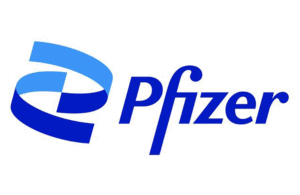 Pfizer (NYSE:PFE) today announced positive topline data from a Phase 3 clinical trial for its bivalent respiratory syncytial virus (RSV) prefusion vaccine candidate.
Pfizer (NYSE:PFE) today announced positive topline data from a Phase 3 clinical trial for its bivalent respiratory syncytial virus (RSV) prefusion vaccine candidate.
The MATISSE (Maternal Immunization Study for Safety and Efficacy) study investigates Pfizer’s RSVpreF vaccine candidate. It observed the vaccine when administered to pregnant participants to help protect their infants from RSV disease after birth. It met the success criterion for one of two primary endpoints.
Observed efficacy for severe medically attended lower respiratory tract illness (MA-LRTI) came in at 81% through the first 90 days of life in a pre-planned interim efficacy analysis. The study demonstrated substantial efficacy of 69.4% for infants over the six-month follow-up period. Although the second primary endpoint’s success criterion wasn’t met, Pfizer observed clinically meaningful efficacy of 57.1% through the first 90 days of life.MA-LRTI measured at 51.3% over the six-month follow-up period.
Pre-planned safety reviews determined that subjects tolerated the vaccine well. Investigators observed no safety concerns for both the vaccinated individuals and their newborns.
Pfizer “thrilled” by data
“We are thrilled by these data as this is the first-ever investigational vaccine shown to help protect newborns against severe RSV-related respiratory illness immediately at birth,” said Annaliesa Anderson, SVP and CSO, vaccine research & development, Pfizer. “These data reinforce Pfizer’s resolve to bring our expertise in the research and development of innovative vaccines to address critical public health needs using new approaches and technologies. We look forward to working with the FDA and other regulatory agencies to bring this vaccine candidate to expectant mothers to help protect their infants against severe RSV during their most vulnerable first six months of life, which has the highest burden of RSV illness in infants.”
At the recommendation of the independent Data Monitoring Committee (DMC) and in consultation with the FDA, Pfizer ended enrollment in the study. Based on the positive results, the company plans to submit a Biologics License Application (BLA) to the FDA by the end of 2022. It expects other regulatory submissions in other geographies to follow.
“Every year we see high levels of RSV cases among babies in the U.S. with some regions reporting hospital admission rates higher than normal this year,” said Dr. Eric A.F. Simões clinical professor, pediatrics-infectious diseases, University of Colorado School of Medicine and Children’s Hospital Colorado, Aurora. “A maternal vaccine with high efficacy that can help protect infants from birth could substantially reduce the burden of severe RSV among newborns through six months of age, and, if approved by regulatory authorities, will likely have a significant impact on disease in the U.S. and globally.”
More RSV vaccine news
Pfizer received FDA breakthrough therapy designation for the vaccine candidate in March 2022. Its positive topline data comes just one day after GSK won validation of the marketing authorization application from the European Medicines Agency (EMA) for its respiratory syncytial virus (RSV) vaccine candidate.
GSK seeks authorization to use the vaccine annually in older adults. It expects European regulators to announce a final regulatory decision in the third quarter of 2023.
The vaccine candidate would be the first vaccine to protect adults 60 and older from the respiratory syncytial virus.
Public health experts worry that this winter could bring a “tripledemic” of COVID-19, influenza and RSV that could swamp hospitals in the U.S. and elsewhere.
In adults and older, healthy children, RSV symptoms are mild and much like the common cold, according to the Mayo Clinic. But babies 12 months and younger, older adults, and people with heart and lung disease or a weakened immune system can suffer a severe infection.
Filed Under: clinical trials, Drug Discovery, Drug Discovery and Development, Infectious Disease



